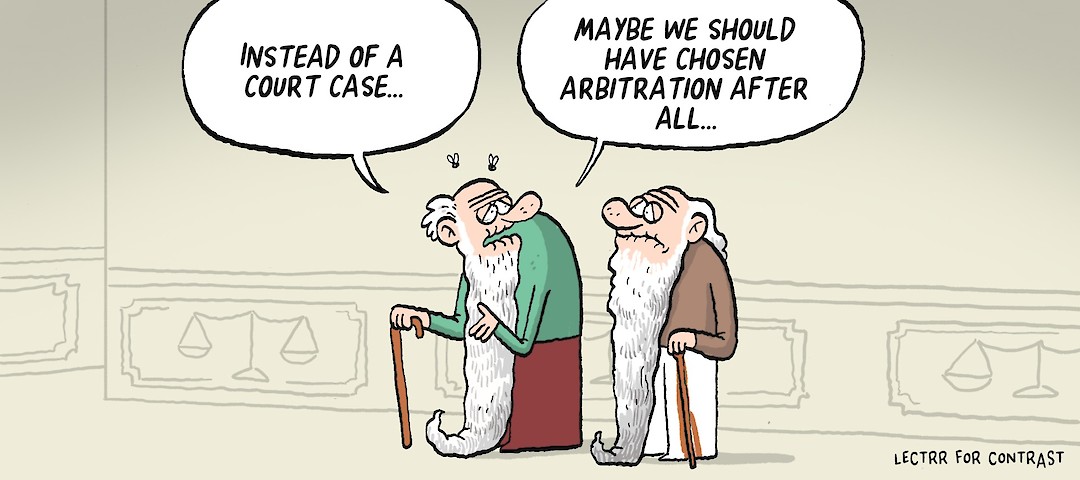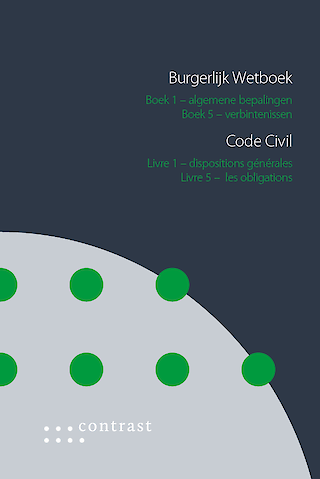In the Picture

Litigation in court vs. arbitration
June 2019Imagine…
Your company is regularly involved in proceedings before the national courts.
Recently this caused some serious frustrations. The legal department is increasingly complaining about the long duration of these proceedings, as a result of which there is a protracted period of uncertainty. The criticism gains even greater weight if, after a proceeding has been won in the first instance, the whole trial essentially has to be conducted all over again on appeal.
Recently these frustrations reached their peak or, perhaps better put, an all-time low: a journalist attended a court session and his newspaper published an excruciatingly detailed account of your dispute with a supplier. You need that kind of negative advertising like a hole in the head.
You would like to try a different approach, and you have heard that other companies insert arbitration clauses into their contracts. Could that be the solution?
A brief clarification
Arbitration is a form of alternative dispute resolution. The parties can choose not to bring their disputes before a normal court of law, but rather to have them resolved by one or several arbitrators.
A dispute can only be settled via arbitration if all of the involved parties expressly agree to do it that way. This agreement can be incorporated into the initial contract between the parties and thus before any dispute arises. The parties can agree to settle a dispute via arbitration even after it has emerged. In that case, a specific contract is concluded for this.
The choice to resolve a dispute via arbitration offers several other advantages as well.
A first important advantage is speed. Arbitration is faster than most proceedings before the courts. The most important reason for this is that, with arbitration, in principle there is no possibility of appeal, so the dispute is resolved in a single instance. Although a nullification proceeding is possible, it can only be pursued on the basis of a limited number of grounds.
Because the arbitrators are appointed by the parties or the specialised institution, in many cases this will lead to a more expert handling of the dispute, since the choice will go to arbitrators with a specialisation in a particular legal field, or with a certain technical knowledge. Moreover, the arbitrators do not have to be jurists. For example, one can opt for a tribunal with two jurists and one specialised technical arbitrator. Especially when it concerns a very specific, technical or complicated dispute, arbitration can thus offer a substantial added value.
Furthermore, arbitration is confidential. This applies for both the written documents and the hearings, as well as for the ultimate ruling (although the parties can give their consent for an anonymised publication of the decision). In this way one can prevent customers, suppliers and competitors, but also the broader public, from ever learning of the existence of the dispute, the proceeding that is conducted on it and the ultimate award. Even government authorities, including the competition authority, are not informed about the dispute.
Finally, arbitration also has major advantages in a cross-border dispute, since arbitration excludes any jurisdictional conflicts that might play a role for the national courts. Under the New York Arbitration Convention of 1958, moreover, an arbitral award can be more easily executed across borders. Over 150 countries are party to this Convention, so that an arbitral award originating in one of these countries can be enforced without much difficulty in other contracting states.
The biggest drawback of arbitration is unquestionably the cost that is associated with it. Because the parties also have to pay for the services of the arbitrators, this cost will be higher than for a proceeding before a national court. Usually, the costs also have to be advanced by both parties, so the upfront expense is significantly higher. In principle, the winning party will be able to recover its outlays (often including the fees of its own counsel) from the losing party. However, that will only take place at the very end of the proceeding.
Concretely:
- The parties can opt to resolve their dispute via arbitration if all parties have expressly agreed to do so, either already in advance or after the dispute has arisen.
- One can choose for an ad hoc procedure or work via an institution such as CEPANI or the ICC.
- The pros and cons of arbitration have to be weighed against one another. Arbitration becomes more interesting as the importance and technicity of the dispute increases and in cases where confidentiality is important.
- Arbitration proceedings are interesting for cross-border disputes, particularly in light of the 1958 New York Convention on the Recognition and Enforcement of Foreign Arbitral Awards.
- Parties must take the cost of an arbitration proceeding into consideration. This has to be paid in advance, and only at the end of the proceeding will it become clear who ultimately has to bear the cost.











